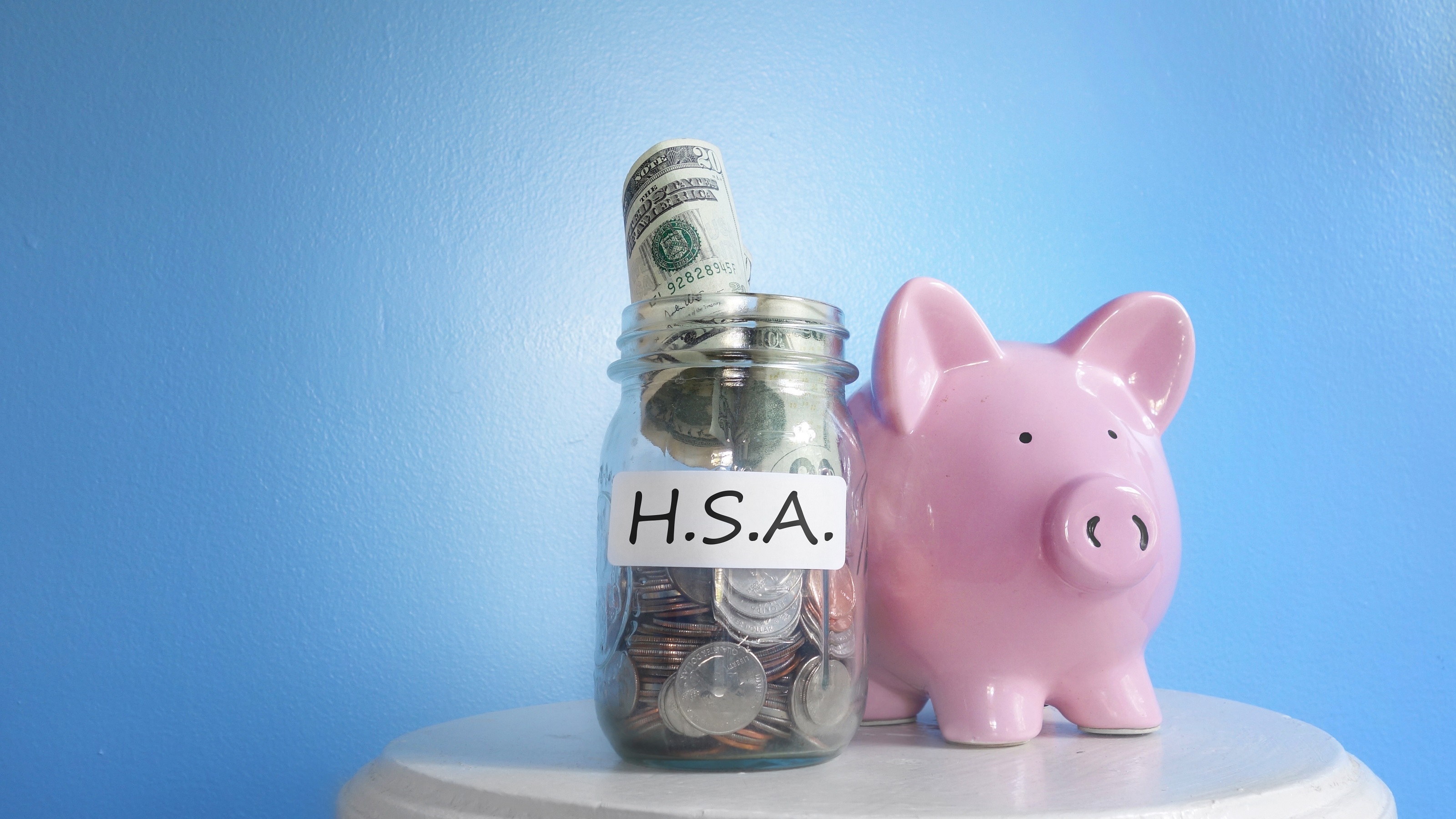Do You Really Know What Your HSA Can Do for You?
Not only do HSAs offer triple tax benefits — pre-tax contributions, tax-free growth and tax-free withdrawals — but they can be used for health care expenses in retirement.


Profit and prosper with the best of Kiplinger's advice on investing, taxes, retirement, personal finance and much more. Delivered daily. Enter your email in the box and click Sign Me Up.
You are now subscribed
Your newsletter sign-up was successful
Want to add more newsletters?

Delivered daily
Kiplinger Today
Profit and prosper with the best of Kiplinger's advice on investing, taxes, retirement, personal finance and much more delivered daily. Smart money moves start here.

Sent five days a week
Kiplinger A Step Ahead
Get practical help to make better financial decisions in your everyday life, from spending to savings on top deals.

Delivered daily
Kiplinger Closing Bell
Get today's biggest financial and investing headlines delivered to your inbox every day the U.S. stock market is open.

Sent twice a week
Kiplinger Adviser Intel
Financial pros across the country share best practices and fresh tactics to preserve and grow your wealth.

Delivered weekly
Kiplinger Tax Tips
Trim your federal and state tax bills with practical tax-planning and tax-cutting strategies.

Sent twice a week
Kiplinger Retirement Tips
Your twice-a-week guide to planning and enjoying a financially secure and richly rewarding retirement

Sent bimonthly.
Kiplinger Adviser Angle
Insights for advisers, wealth managers and other financial professionals.

Sent twice a week
Kiplinger Investing Weekly
Your twice-a-week roundup of promising stocks, funds, companies and industries you should consider, ones you should avoid, and why.

Sent weekly for six weeks
Kiplinger Invest for Retirement
Your step-by-step six-part series on how to invest for retirement, from devising a successful strategy to exactly which investments to choose.
Over the past several years, health savings accounts (HSAs) have grown in both interest and popularity — so much so that there were $104 billion in HSA assets held among 35.5 million accounts at the end of 2022, according to Devenir Research. It’s easy to understand why this interest is on the rise, as HSAs can be a great solution to help cover eligible out-of-pocket medical costs. However, while the interest is high, the reality is that many individuals may not fully understand all that HSAs have to offer — especially when it comes to saving for their future, too.
With employers increasingly offering high-deductible health plans with an HSA option to their employees, you may already have an HSA or perhaps are considering opening one. So, as we enter open enrollment season, now presents a great time to make sure you really understand how your HSA can benefit you both today and in the future. Here are a few things to keep in mind.
HSAs can be used to pay for health care expenses in retirement
An HSA is a savings account that eligible individuals can open and contribute to on a pre-tax basis, effectively reducing their taxable income. As long as there are funds in the account, it can be used to pay qualified medical expenses today, tomorrow and throughout retirement years.
From just $107.88 $24.99 for Kiplinger Personal Finance
Become a smarter, better informed investor. Subscribe from just $107.88 $24.99, plus get up to 4 Special Issues

Sign up for Kiplinger’s Free Newsletters
Profit and prosper with the best of expert advice on investing, taxes, retirement, personal finance and more - straight to your e-mail.
Profit and prosper with the best of expert advice - straight to your e-mail.
However, according to Voya research, while the general understanding that HSAs can be used to pay for health care expenses in retirement has increased noticeably (from 43% in 2020 to 55% in 2023), just over half of Americans know that HSAs can be used for health care expenses in retirement.(1)
Due to the trend of rising health care costs and the fact that health care needs generally increase as one ages, a big contributor to the potential retirement savings gap is the ever-increasing cost of health care. Consider the dynamic of retirees who depend on their savings for a portion of their retirement income. As they age, their savings balances are drawn down.
Additionally, the longer retirement lasts, the greater the likelihood that health care needs will increase. So, when it comes down to it in retirement, many individuals simply don’t have enough savings to cover health care expenses and daily living expenses. Enter HSAs, which are uniquely positioned to potentially help lessen the retirement health care savings gap. Not only can HSAs offer flexibility on how the accounts are funded, what the funds can be used for and when, they offer triple tax benefits, including pre-tax contributions — and the potential for both tax-free growth and tax-free withdrawals.
As employees work toward their retirement, they’ll be able to make pre-tax contributions and tax-free withdrawals as needed for HSA-qualified expenses. If funds are used for non-eligible expenses, they are taxed and penalized an additional 20%.
However, what many people may not realize is that once you reach retirement age at 65, HSA funds can be used for non-medical expenses without being assessed a 20% penalty. Therefore, you can use your HSA to pay for general living expenses — like housing, food or travel, for example. However, these distributions will be taxed much like any normal distribution from a retirement account, like an IRA or 401(k).
And even in retirement, if you decide to spend your HSA dollars on qualifying medical expenses, you will still enjoy tax-free distributions — providing flexibility to spend your money how you want. Just keep in mind once you turn 65 and are enrolled in Medicare, you are no longer eligible to contribute.
HSA funds can be an investment opportunity
According to Voya research, only 26% of working Americans know that HSAs can be used as an investment vehicle — a powerful benefit of these savings solutions. Similar to lineups available in typical workplace retirement accounts, like a 401(k), once you reach a certain threshold in your account, your HSA funds can be invested. While the threshold varies by HSA plan, some plans may require only an HSA balance of $1,000 to begin investing your funds.
So, HSAs can serve as an important vehicle with a potential to grow over the long term. Unless you plan to use your HSA money for planned expenses in the near future, investing can give your money an opportunity to grow over time, but as with any investment, there are risks; make sure to fully explore those risks before choosing to invest your balance.
HSAs can be used for emergency health care savings
According to Voya data, we know that a lack of emergency savings can put one’s retirement at risk, as employees without adequate emergency savings are 13 times more likely to take a hardship withdrawal from their retirement account.(2) And, when faced with a short-term, unexpected need — such as an emergency trip to the hospital — some people may choose to dip into this account to cover the expense.
It’s important to understand that removing funds from a retirement plan may not be an option, and if it is, it should not be done lightly. The interest in growing an emergency fund is becoming more and more critical for individuals today — so much so that recent Voya data has found more than half (55%) of working Americans are more likely to stay with their current employer if they offer a workplace emergency savings plan.(3)
Fortunately, the dollars in your HSA can be used for unplanned or emergency medical expenses as long as they are eligible. All HSA withdrawals used to pay for qualified medical expenses (even if unplanned) are tax-free. Plus, if you are able to, you can choose to cover a medical bill out of pocket and then be reimbursed tax-free for that expense in the future when you then need those funds. This strategy is another way funds in an HSA can serve as emergency savings. Just make sure to hold on to your receipts to verify all distributions.
Your employer may have more to offer than you think
In today’s world, individuals are often faced with competing priorities when it comes to divvying up their paychecks and making decisions about where to save. The important considerations of retirement, health care, paying off debt and the desire to build an emergency fund are all factors to consider when thinking about one’s future. As a result, resources such as health savings accounts, which help offset the burden of medical costs, or student loan debt support and tools for building emergency savings continue to grow in popularity as employers’ “wellness benefits.”
So, as we approach open enrollment season, now presents an opportune time to not only ensure you understand the benefits of your workplace benefits and savings but to also ensure you understand the other optimal resources that might be available to you from your employer.
1) Results of a Voya Financial Consumer Insights & Research survey conducted with Morning Consult between March 9-15, 2023, among n=500 working Americans age 18+ who have both an employer-sponsored retirement plan and a medical/health plan, featuring n=188 health savings account owners.
2) Voya Financial internal data (Oct. 2020).
3) Based on the results of a Voya Financial Consumer Insights & Research survey conducted June 12-13, 2023, among 1,004 adults aged 18+ in the U.S., featuring 483 Americans working full time or part time.
related content
- The Ultimate Retirement Savings Account? Surprise, It’s an HSA!
- No Long-Term Care Plan? Here’s What to Do About It
- Medicare Checklist: Avoid Costly Enrollment Mistakes
- Are You Prepared for Health Care Costs While in Retirement?
- Struggling to Understand Your Employee Benefits Package? Six Ways to Make Sense of It
Profit and prosper with the best of Kiplinger's advice on investing, taxes, retirement, personal finance and much more. Delivered daily. Enter your email in the box and click Sign Me Up.

Nate Black is vice president (VP) of Health Solutions Product for Voya Financial, Inc. (NYSE: VOYA), a leading health, wealth and investment company. In this role, Black leads Voya’s Health Solutions Product teams, including Supplemental Health, Life/Absence/Disability, and Health Account Solutions. In his role, Black is responsible for guiding the management of existing products and bringing new offerings to the market.
-
 Ask the Tax Editor: Federal Income Tax Deductions
Ask the Tax Editor: Federal Income Tax DeductionsAsk the Editor In this week's Ask the Editor Q&A, Joy Taylor answers questions on federal income tax deductions
-
 States With No-Fault Car Insurance Laws (and How No-Fault Car Insurance Works)
States With No-Fault Car Insurance Laws (and How No-Fault Car Insurance Works)A breakdown of the confusing rules around no-fault car insurance in every state where it exists.
-
 7 Frugal Habits to Keep Even When You're Rich
7 Frugal Habits to Keep Even When You're RichSome frugal habits are worth it, no matter what tax bracket you're in.
-
 For the 2% Club, the Guardrails Approach and the 4% Rule Do Not Work: Here's What Works Instead
For the 2% Club, the Guardrails Approach and the 4% Rule Do Not Work: Here's What Works InsteadFor retirees with a pension, traditional withdrawal rules could be too restrictive. You need a tailored income plan that is much more flexible and realistic.
-
 Retiring Next Year? Now Is the Time to Start Designing What Your Retirement Will Look Like
Retiring Next Year? Now Is the Time to Start Designing What Your Retirement Will Look LikeThis is when you should be shifting your focus from growing your portfolio to designing an income and tax strategy that aligns your resources with your purpose.
-
 I'm a Financial Planner: This Layered Approach for Your Retirement Money Can Help Lower Your Stress
I'm a Financial Planner: This Layered Approach for Your Retirement Money Can Help Lower Your StressTo be confident about retirement, consider building a safety net by dividing assets into distinct layers and establishing a regular review process. Here's how.
-
 The 4 Estate Planning Documents Every High-Net-Worth Family Needs (Not Just a Will)
The 4 Estate Planning Documents Every High-Net-Worth Family Needs (Not Just a Will)The key to successful estate planning for HNW families isn't just drafting these four documents, but ensuring they're current and immediately accessible.
-
 Love and Legacy: What Couples Rarely Talk About (But Should)
Love and Legacy: What Couples Rarely Talk About (But Should)Couples who talk openly about finances, including estate planning, are more likely to head into retirement joyfully. How can you get the conversation going?
-
 How to Get the Fair Value for Your Shares When You Are in the Minority Vote on a Sale of Substantially All Corporate Assets
How to Get the Fair Value for Your Shares When You Are in the Minority Vote on a Sale of Substantially All Corporate AssetsWhen a sale of substantially all corporate assets is approved by majority vote, shareholders on the losing side of the vote should understand their rights.
-
 How to Add a Pet Trust to Your Estate Plan: Don't Leave Your Best Friend to Chance
How to Add a Pet Trust to Your Estate Plan: Don't Leave Your Best Friend to ChanceAdding a pet trust to your estate plan can ensure your pets are properly looked after when you're no longer able to care for them. This is how to go about it.
-
 Want to Avoid Leaving Chaos in Your Wake? Don't Leave Behind an Outdated Estate Plan
Want to Avoid Leaving Chaos in Your Wake? Don't Leave Behind an Outdated Estate PlanAn outdated or incomplete estate plan could cause confusion for those handling your affairs at a difficult time. This guide highlights what to update and when.